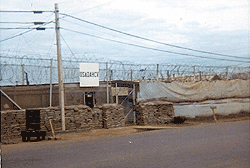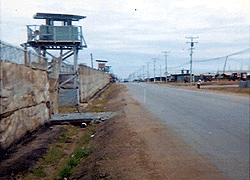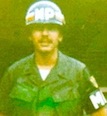Reflection "I started my tour in Can Tho [IV Corps Tactical Zone] in February of 1971. A few months into my tour Jerry Davis and I were sent to Long Binh Post, [III Corps] TDY [Temporary Duty] to work as security guards at the new Drug Detoxification compound. Since B Company was headquartered in the Mekong Delta and didn't have any barracks on Long Binh Post we stayed with A Company.
The detachment was made up of MPs from all three companies. The 720th was always short handed, it's amazing what we did with so few people. Some time in mid 1971 the Army started giving everyone a urine test for drugs before you could return home. Anyone who tested positive was sent to this compound to dry out. They pretty much cold turkey these guys.
At the compound we manned guard shacks 24 hours a day, seven days a week on the perimeter of the compound. we had a platoon sergeant from C company, a SFC or SSG. I thought his name was Harley, an older white male, I don't see his name on the roster though.
We had MP's assigned to standing watch in the mess lines insuring that only food was transferred to plates. I guess the drugs could have been buried in the food, but how would you know? We also watched the water truck driver to make sure he wasn't leaving anything behind.
We did find some heroin in a couple shake downs in the compound. We knew they weren't bringing it in because we strip searched every one of them and they didn't get their clothes back. They would hide it in the latrines on top of the walls or rafters. They were smart enough to not keep it on themselves. We never did find out for sure who was bringing it in. The food was catered in from another mess hall so it was either the guys that brought the food or the guy that delivered water for the showers. Those were the only outsiders allowed in the compound.
Once the withdrawals were over we would transport them down to Tan Son Nhut Airfield and fly them in a an Army Caribou up to Cam Ranh Bay and transfer them over to another MP Company.
During the flight they were in custody status but not shackled or hand cuffed. This was the last leg of going home for them so they weren't going to try and escape. Escape to where anyway. The number of MP's on the detail would vary as to how many prisoners we were transporting.











 SP/4 Bosmans
SP/4 Bosmans SP/4 Denbow
SP/4 Denbow